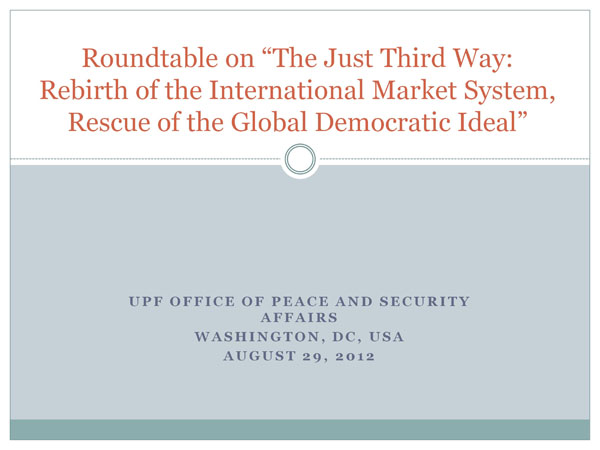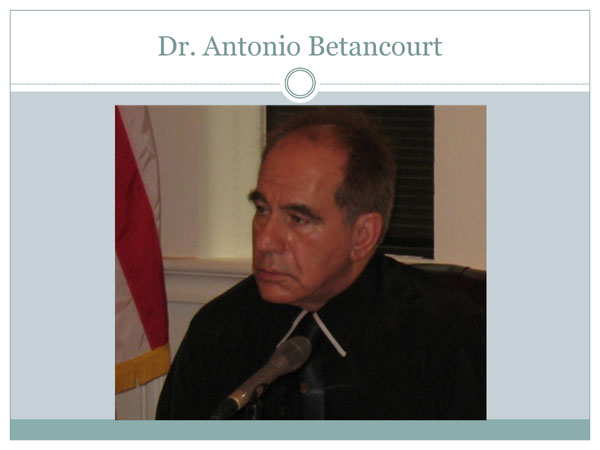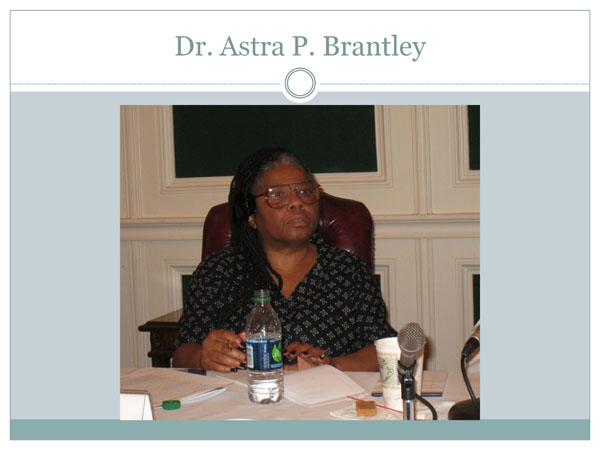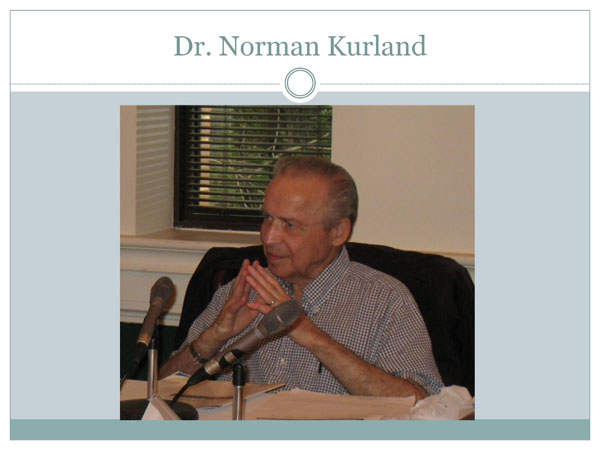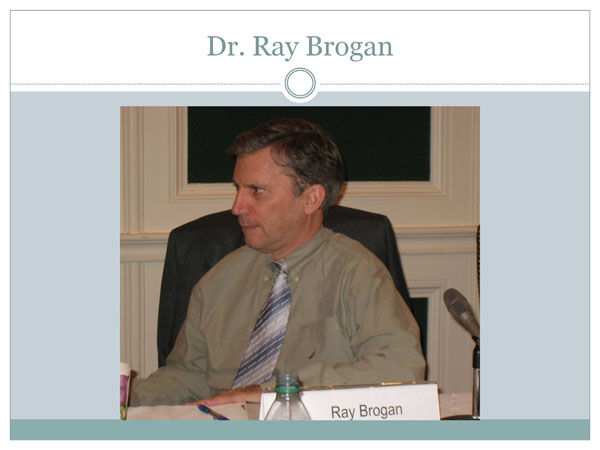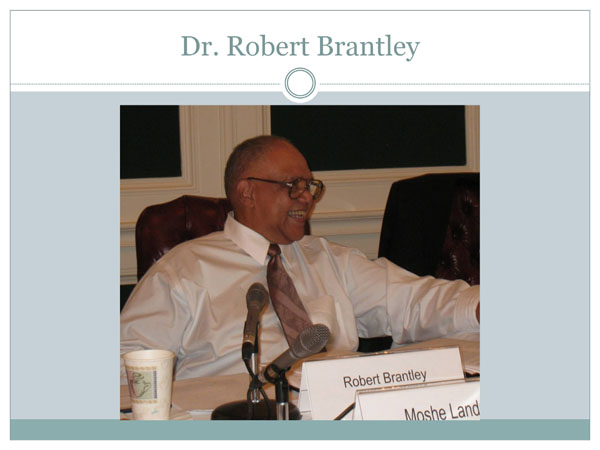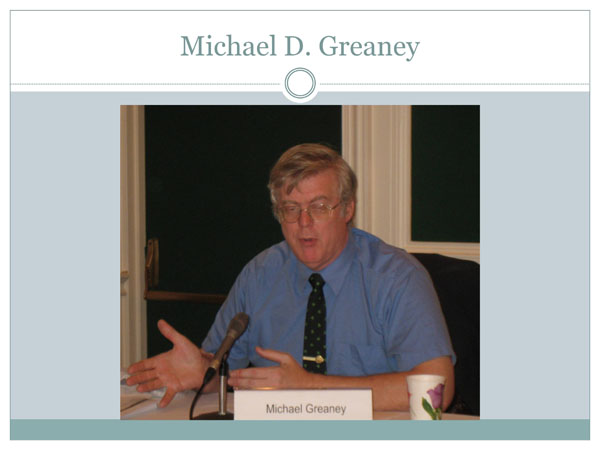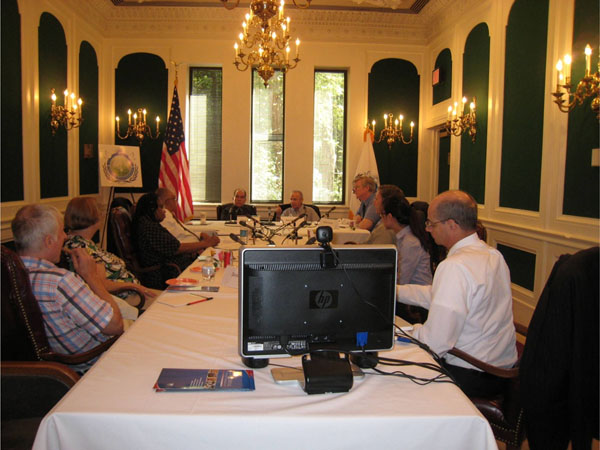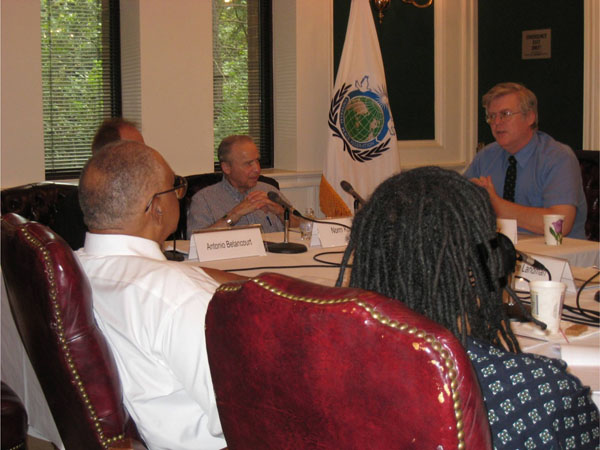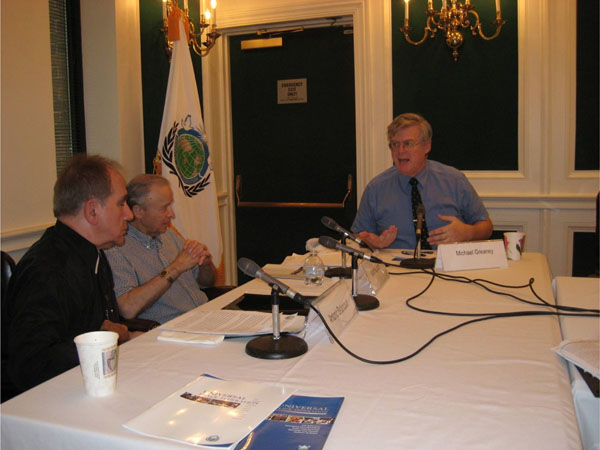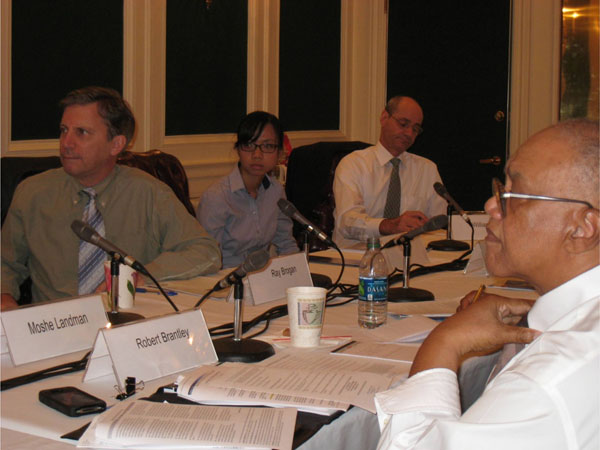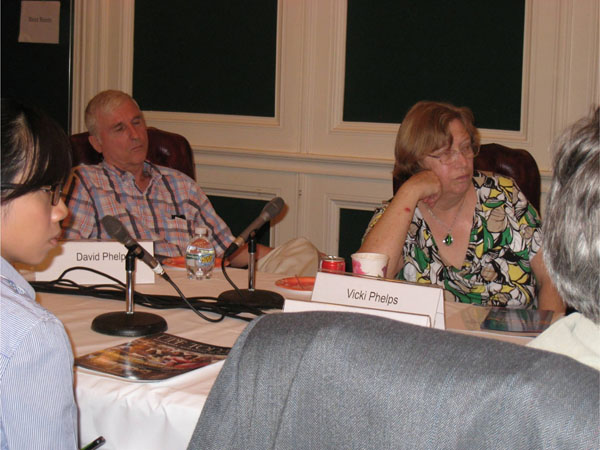Washington DC Peace & Security Forum
Washington DC Forum: The Just Third Way: Rebirth of the International Market System
Written by UPF Office of Peace and Security Affairs
Wednesday, August 29, 2012
Washington DC, USA - With the theme: “The Just Third Way: Rebirth of the International Market System, Rescue of the Global Democratic Ideal,” the Office of Peace and Security Affairs of the Universal Peace Federation hosted a roundtable on Aug. 29, 2012 at the Green Room of The Washington Times in Washington, DC.
Dr. Antonio Betancourt, Director of the Office of Peace and Security Affairs, opened the roundtable greeting everyone on behalf of UPF International and its founders the Rev. Dr. Sun Myung Moon and Dr. Hak Ja Han Moon. Dr. Betancourt said:
In 1991, upon the collapse of the socialist and Communist experiment in the Soviet Union after more than 70 years of a state command economy, there were great pronouncements that capitalism had triumphed over Communism and socialism. Today, 21 years later, we see clearly that the traditional capitalist system is not equipped to resolve the grievances, social conditions, lack of opportunities, and need of participation of the masses in the economy that gave birth to the socialist and Communist systems. To the contrary, the capitalist system is exhausted, and, according to experts, has come to the end of its rope since 2008. It continues to struggle for survival around the world. The Euro, the basis of the monetary system of most countries within the European Union and whose global financial transactions amount to tens of trillions of dollars, is in danger of collapse.
There is a specter of financial chaos within industrialized democracies. This would bring political and social breakdown. This possibility is looming over the heads of many countries and the world in general. The danger of the collapse of the international system is not hysteria coming from uneducated opinion. These forecasts come from credible and highly responsible scholars and experts. If the present monetary and financial system fails, naturally the experiment of political democracy of the last 200 plus years will also fail.
In light of the dangers and the implications for the security of the international democratic system, the Office of Peace and Security Affairs of UPF International in Washington, DC convened a roundtable on August 29 with the theme: ‘The Just Third Way: Rebirth of the International Market System, Rescue of the Global Democratic Ideal.’
We have invited scholars from the Center for Economic and Social Justice (CESJ), Dr. Norman Kurland, President of CESJ, principal author of Capital Homesteading for Every Citizen (2004), and Mr. Michael D. Greaney, CESJ’s Director of Research, author of the newly released The Restoration of Property (2012), Also present are Drs. Robert and Astra Brantley, scholars from CESJ, all pioneers in identifying solutions to the problems inherent in the socialist and capitalist models of economics. They have been developing formulas, principles, legal models, new financial instruments and best practices to speed the participation of citizens in America and around the world as owners of new economies that are developing to lift the masses out of poverty and dependency on government handouts or the insecurities of labor for hire.
Also present for the program are former editor of the journal The World and I, Mrs. Vicki Phelps and community organizer Mr. David Phelps, Professor and consultant of research methodology, Dr. Raymond Brogan, and Ms. Ly Phan, student of international relations at American University. From the Office of Peace and Security Affairs of UPF International in Washington, in addition to myself, Dr. Antonio Betancourt L., Director, Office of Peace and Security Affairs, UPF International, and moderator for the roundtable, are Dr. William Selig Deputy Director, and Dr. Mark P. Barry, advisor to UPF’s Office of Peace and Security Affairs participating via Skype.
The main presenter is Dr. Norman Kurland, who in addition to being President of CESJ, is a lawyer-economist and known as the foremost expert on the concepts and applications of “The Just Third Way.” He has worked nearly five decades designing solutions for property-less workers and citizens to become full participants in a market economy as direct owners of capital. Dr. Kurland was a close associate and the Washington counsel of Louis Kelso, creator of the Employee Stock Ownership Plan (ESOP). With Kelso, he helped introduce in the mid-1970s the first U.S. ESOP laws. Later, Kurland and his colleagues introduced the first ESOP laws in the developing world.
As a result of the opportunities opened up by Kelso, Kurland and other pioneers, today more than 10 million working Americans own equity shares totaling US$870 billion in over 10,000 U.S. corporations where they work. To broaden capital ownership opportunities to all citizens, Kurland authored such expanded ownership innovations as the for-profit, citizen-owned Community Investment Corporation (now called the “Citizens Land Bank”), and the comprehensive national legislation known as “The Capital Homestead Act.”
I am so happy that we are putting together this program to address the deficiencies of the present economic and political system led by the U.S. and other industrialized democracies. If the system fails it will take two to three generations of possible chaos and tyranny to correct. Therefore the importance of revisiting the well-articulated proposals and works of Louis Kelso and the CESJ at this crucial time in the world today. Dr. Norman Bailey who was Special Assistant for International Economic Policy to President Ronald Reagan in the National Security Council of the White House said about the “Just Third Way”: "We should illustrate why the capitalist experiment is out of control and has helped significantly reduce the size of the middle class in the U.S. and elsewhere.” In my conversations with Dr. Bailey he worried that current trends could eventually lead to tyranny.
Dr. Betancourt explained how the Washington Office of Peace and Security Affairs of UPF International decided to reach out to CESJ in general and Dr. Kurland in particular to investigate how CESJ’s proposals could be integrated into UPF proposals for best ideas, best practices and best techniques to present to the world as a workable resource to avert the extreme danger that the world is in. Dr. Betancourt highlighted the fact that without a foundation in virtue it is impossible to come up with a viable solution to today’s seemingly endless series of crises. Dr. Betancourt then turned the floor over to Dr. Kurland.
The Global Economic System — What is Wrong?
Dr. Kurland agreed with Dr. Betancourt that the underlying problem is a moral issue. Dr. Kurland believes that academia is largely to blame for this situation. Academia is carrying many bad ideas from the past — centered on the “Labor Theory of Value” (the economic theory that stipulates that the value of a good or service is dependent upon the labor used in its production) — that have influenced generations of students of economics, the leaders of yesterday and today.
As a result of the labor theory of value, society has been (mis)educated to tolerate the wage system that characterizes both capitalism and socialism. This has led to unjust divisions between those few who control the economic lives of the many who work for them. While most people want “economic justice,” few people can offer workable moral principles that define the term.
The effects have been devastating. In the areas being addressed by the roundtable, acceptance of the labor theory of value has led to the widespread and unquestioning implementation of the tenets of Keynesian economics. Beginning with the New Deal in the United States, this cemented an erroneous economic and financial paradigm expanded into global policy.
The conviction persists that economics and the other social sciences, although based on human nature, have no connection with basic morality. This implies that humanity is not moral by nature. Our finest law schools do not even teach justice, the premier temporal virtue. Consequently, no mainstream school of economics — Keynesian, Monetarist/Chicago, or Austrian — offers any morally sound definition of economic justice.
Derived in large measure from the analysis of Karl Marx in The Communist Manifesto and Das Kapital, academia supports the pernicious idea that the masses must be confined to labor alone as the way to gain income. Capitalism does not improve on this by asserting the complete freedom of the market as the solution to government control or the abolition of private property.
Capitalists do not recognize barriers that have existed within the economic system preventing most people from owning capital. Dr. Betancourt commented that these ideas, dating from the 19th century, have resulted in the wage system that characterizes both capitalism and socialism, being imposed throughout the world, both with monopolistic characteristics embedded in them. Capitalism as we know it creates monopolies within the private sector of the economy. Socialism and Communism each creates a monopoly within the bureaucracy of the state controlling capital and credit, with the result that injustice and bad economic conditions continue to persist.
Countering both the socialists and capitalists, the late lawyer-economist Louis O. Kelso (as Milton Friedman commented) turned Marx on his head by proposing a “binary” theory of economics. Kelso’s theory is a logical framework that realistically divides the inputs to the production of marketable goods and services into two interdependent factors: “labor” and “capital.”
Labor refers to all forms of physical, mental and entrepreneurial work that humans contribute to the economic process. Capital refers to all non-human factors of production, including land, plant and equipment, advanced technological tools, rentable space, physical infrastructure, and intangibles, such as patents, copyrights and advanced management systems.
Kelso pointed out the wage system denies that people can own the capital that is displacing them from their wage system jobs. Kelso is best known as the inventor of the Employee Stock Ownership Plan (ESOP). The ESOP has enabled property-less workers in the private sector to acquire up to 100 percent of the ownership of their company, all on credit, without taking any existing savings from the workers or reducing wages or benefits.
Lack of Capital Ownership
According to Dr. Kurland, the “ownership gap” is the most obvious symptom of what is wrong with the global economy. Much of the problem is caused by the fact that most people simply do not understand why property and capital — an institution that Marx would have abolished — is so important. Then, not understanding all the reasons why property is important, they do not understand property. They fail to grasp the fact that “property” is not the thing that is owned, but the natural right to be an owner, and the socially determined bundle of rights and powers that define how an owner may exercise that right — to enjoy the fruits and, in general, not to harm others or the common good.
In the most immediate sense, property in both labor and capital is important because of the income it provides. This, however, only considers one aspect of property, although it is a very important aspect. That is the personal aspect of property, the fact that ownership of labor or capital entitles you to the fruits of that ownership, that is, what is produced by what you own. If, for example, you own an apple tree, you and no one else are entitled to all the apples the tree produces.
There is also the threefold social aspect of property, that is, one, the right to exclude other people from enjoying the fruits of what you own. Two, the duty not to use what you own to harm other people, institutions, or the common good. Three, the power that ownership gives you to enter into social relationships — contracts — with other people on an equal basis. As Daniel Webster said, “Power naturally and necessarily follows property.”
America’s Founders recognized the truth of this principle and refused to give the vote to people who did not own a minimum of capital. Abraham Lincoln’s 1862 Homestead Act made a limited form of capital (land) available to qualified individuals, but did not address the unlimited capital frontier represented by industrial and commercial growth and later by technical innovation, new energy, robotics and IT.
In 1975, Ronald Reagan declared that what we need is an Industrial Homestead Act, a concept that CESJ has expanded to include all forms of capital as a “Capital Homestead Act.” A decade later, mandated by Congress and under President Reagan, CESJ’s Presidential Task Force on Project Economic Justice (undertaken without any tax funding by private contributions) proposed a feasible program to implement widespread capital ownership throughout Central America and the Caribbean Basin as a counter economic proposal to the threat of Marxism.
The program was not implemented, probably due to the illusion fostered by the fall of the Soviet Union that capitalism had “won,” and the proposed practical counterproposal to Marxism was therefore unnecessary. Dr. Betancourt remarked that the Task Force Report should be updated and republished due to its relevance for today.
Vicki Phelps asked if CESJ had managed to present its ideas to either President Obama or Governor Romney in the current political campaign. Dr. Kurland said that, as of yet, they had not succeeded in getting past the “gatekeepers.” After attending a talk by Representative Paul Ryan at the Atlas Foundation before Mr. Ryan was selected as the Republican candidate for Vice President, Dr. Kurland handed Mr. Ryan a copy of the “Summary of the Capital Homestead Act.” Mr. Ryan has never responded.
Many people ignore the social aspect of property, and assume that property is important only because of the income it generates. The belief spreads that people have a right to adequate income, regardless of the source. This leads to the belief that, if some people have not earned enough income, those who have earned high incomes should redistribute their earnings to those who earned less.
Within this paradigm the government should redistribute wealth from those who own capital to those who do not. In Keynesian economics this is usually done by issuing debt-backed fiat money, inflating the currency, and redistributing existing wealth through the hidden tax of inflation.
Keynesian “demand-side” stimulus by government increases consumption artificially, causing inflation, and clearing existing inventories at higher prices. The production side of the economic equation thereby realizes higher profits. Little of the benefit of inflation flows to wage earners and consumers. Instead, capital owners realize more income for producing less, while debtors repay their obligations with cheaper money, depriving savers of their just due. The Keynesian system thereby encourages unproductive spending and waste.
Debt- Instead of Asset- Financing
The major problem with the global financial system today is that virtually the entire supply of currency — that on which governments and non-owning consumers rely for purchasing power — is backed by “sovereign debt” in accordance with Keynesian “Modern Monetary Theory,” or “MMT.” “Sovereign debt” is, in turn, backed by the issuing government’s ability to collect taxes in the future out of private sector production.
Private sector production of marketable goods and services might not take place, however, if the government undermines the country’s capacity to produce by burdening the country with non-repayable debt. Right now the United States government is “officially” $16 trillion in debt. This is only a fraction of the $70 trillion or so obligation assumed by the government. This includes “off-the-books” promises for Social Security, Medicare, and pensions for politicians and government workers. A debt amounting to over $500,000 per U.S. household is being pushed off on our children.
The primary way in which governments undermine a country’s capacity to produce is by carrying out Keynesian programs that seek to maintain consumer (and government) purchasing power at the expense of productive capacity. To stimulate consumer demand or “prime the pump,” governments issue increasing amounts of currency backed only by the government’s promise to pay out of future taxes. This discourages private sector productive growth, making it increasingly unlikely that the tax base can redeem the government’s promises when they fall due.
The productive sector can only keep going by issuing its own money — “money” being understood in legal and accounting terms as “anything that can be accepted in settlement of a debt.” The private sector can thus issue its own money in the form of mortgages on existing inventories and bills of exchange on future production. These instruments are either used directly as money by the issuers, or taken to a commercial bank and exchanged for demand deposits. In contrast to the government-issued or authorized debt-backed currency, this private sector money supply is backed by the present value of existing and future assets.
As long as the private sector can produce marketable goods and services with a value in excess of both its own money and the government currency, the currency will either be stable in value, or appreciate in value, making goods cheaper for both domestic and foreign customers. If the government issues fiat money in excess of the capacity of the private sector to produce marketable goods and services, the currency will depreciate in value, making goods more expensive for both domestic and foreign customers.
At some point productive capacity can entirely disappear, triggering “hyperinflation” (a condition in which the price level rises faster than even the money supply can be expanded). To cure the resulting chaos people will even bring in a Hitler to restore order.
Financing for new capital formation (and thus job creation) can come either out of accumulations of debt-backed currency, as Keynes and others believe essential or asset-backed private sector money. The latter was proposed by Dr. Harold G. Moulton, president of the Brookings Institution from 1928 to 1952, in his effort to present an alternative to the Keynesian New Deal. Michael Greaney commented that Moulton’s financing concepts are not theory, but are based on empirical evidence as to how capital formation has been financed during periods of rapid economic growth.
If a system uses debt-backed financing controlled by the government as Keynesian theory dictates, the economy will be inflationary and discourage productive activity, even though the rich will in effect bribe the government to obtain privileges. If a system uses asset-backed financing per Moulton’s analysis, and adds an intensive program to expand ownership of new capital as Kelso proposed, the economy will be growth-oriented without either inflation or deflation, and sustain consumer demand naturally, without the need for artificial stimulus or government deficits.
Functional Overload of Government
If an economy finances new capital by cutting consumption and accumulating debt-backed currency, consumer demand will fall and be unable to sustain new capital. Productive capacity declines, the tax base erodes, debt mushrooms, and jobs are lost. This is what has happened in Greece and is threatening many other countries.
To try and counter these effects of bad monetary and fiscal policy, governments attempt to take over more direct control. This control is first exerted over the economy, then over families and individuals, and finally even over religion when a religious belief or practice comes into conflict with increasingly desperate efforts to micromanage the economy for political ends.
The end result is that, having gone far beyond its legitimate role, as in Greece, the government begins to implode from the political and economic stresses self-induced through adherence to Keynesian ideas. Foreign interests, both private and national, move in to protect their concerns, and the country faces loss of sovereignty, both national and individual.
The Potential of the “Just Third Way”
A solution to the current global economic and political crisis that has not yet been considered is the “Just Third Way,” a vision of the future based on Kelsonian binary economics. Consistent with nature and the demands of human dignity, the Just Third Way is a free market system that economically empowers all individuals and families through the democratization of money and credit for new production, with universal access to direct ownership of income-producing capital. This socio-economic paradigm offers the logical “third alternative” to the two predominant monopolistic, socio-economic paradigms today — capitalism and socialism/communism.
In the Just Third Way, widespread capital ownership functions as the economic check against the potential for corruption and abuse of concentrated power, whether by a minority in the private sector or in the government. Restoration of the full rights of property and extension of private property to every individual serves as the basis for economic democracy and the diffusion of economic power, the necessary foundation for effective political democracy.
The Just Third Way views healthy self-interest (i.e., where individual good is directed toward, or in harmony with, the common good) as a virtue. Greed (on the right) and envy (on the left) are vices, both of which are destructive of a moral and just society. In contrast with monopoly capitalism, which institutionalizes greed, and socialism, which institutionalizes envy, the Just Third Way institutionalizes justice — particularly the principles of economic justice presented in the work of Louis O. Kelso and philosopher Mortimer J. Adler (see below).
CESJ is currently working in urban and rural communities to develop models to demonstrate how these ideas can be implemented today. CESJ has also developed the concept of a “parallel legal system” so that countries and regions that want to experiment with these ideas can do so without disrupting or changing the entire economic system. By implementing tax and banking reforms that would simplify the tax system and use future savings instead of past savings to finance new capital, any country in the world can make a trial of these ideas before making a complete changeover.
Michael Greaney emphasized, again, that these ideas are not just theory. There are laws in place right now in the United States that permit a limited micro-scale implementation in individual companies. An enterprise that is organized as a “Subchapter S Corporation” and is 100% owned by the workers through an Employee Stock Ownership Plan (ESOP) pays no state or federal corporate income tax. ESOP “participants” pay no income taxes on corporate earnings until they receive the cash in hand.
When worker ownership is combined with participatory management and profit sharing, the National Center for Employee Ownership in Oakland, California, reports that a company is typically 1.5 times as profitable as otherwise comparable firms. We believe that an S-Corp ESOP combined with a “Justice-Based Management” (JBM) system, profit sharing, and other features is the best way to take advantage of these findings. From a Just Third Way perspective, U.S. ESOPs are not perfect. Many have no worker representation on the board of directors, suffer from low dividend payouts, do not pass-through the vote, and so on as was the desire of creators Louis Kelso and Norman Kurland. Other countries could vastly improve on the success of the ESOP in the United States with some relatively simple changes in existing laws and implementing JBM systems.
The Three Principles of Economic Justice
Economic justice is a subset of social justice. It encompasses the moral principles that guide people in creating, maintaining and perfecting economic institutions. These institutions determine how each person earns a living, enters into contracts, exchanges goods and services with others, and otherwise produces an independent material foundation for economic subsistence.
The ultimate purpose of economic justice is to free each person economically to develop to the full extent of his or her human potential. This includes especially those who are disabled or whose labor is displaced by robots and advanced information systems, people for whom the Just Third Way provides a “built in” preferential option by vesting them with the same opportunity and means to acquire capital as anyone else. Ownership of productive capital enables each person to engage in the unlimited work beyond economics, the work of the mind and the spirit done for its own intrinsic value and satisfaction: “leisure work.”
David Phelps asked for clarification of the apparent oxymoron “leisure work.” Norman Kurland explained that the concept covers the unpaid creative work of civilization that advances the common good and builds an environment within which virtue can develop and flourish.
The triad of interdependent principles of economic justice that serve as the moral basis of binary economics are the principle of Participation (or Participative Justice), the principle of Distribution (or Distributive Justice), and the “anti-greed” principle of Limitation (sometimes referred to as Harmony or Social Justice).
Participation - Also known as “participative justice,” the principle of participation is the “input principle” or the production side of the economic process. It refers to the moral right that everyone has to participate fully in all institutions of the common good, including a right of access to the means to participate in economic activity as a capital owner. George Mason, in the 1776 Virginia Declaration of Rights, specified as one of the fundamental human rights, access to “the means of acquiring and possessing property.” As defined by Kelso and Adler, participative justice refers to the moral ordering of our economic institutions.
This principle requires that every person have access to the means and opportunity to contribute economic value through both labor and capital inputs. In economic justice, distribution follows participation. What each person is entitled to receive is determined by his or her relative contribution/participation. As advancing technology begins to contribute a proportionately greater share than human labor to the production of marketable goods and services, participative justice demands the elimination of barriers to capital ownership. Participative justice also requires the universalization of access to such social goods as capital credit through a well-organized banking and legal system.
Distribution - Also known as “distributive justice,” distribution is the “outtake” principle in the economic process that holds that the contribution of labor to the economic process should be compensated at the market-determined rate (or “just wage”) for each particular type of human contribution to the production of marketable wealth. This principle dictates that the contribution of capital should be compensated by the “just profit” generated by the project or enterprise. (Profit is determined by the market-based rental value of contributed capital assets — the bottom-line — resulting from market-determined “just prices” less the market-based cost of all labor, material, and other costs of producing and marketing goods and services.
Limitation/Harmony/Social Justice - This is the “feedback” principle that balances the production and distribution sides of the economic process. This principle operates to restore just participation and just distribution within any economic system. Kelso and Adler referred to this principle as the “principle of limitation.” Others use the terms “harmony” or “social justice,” as it calls for the restructuring of the economic system to restore participative and distributive justice.
The Four Pillars of an Economically Just Society
Ultimately, the goal of the Just Third Way is to establish and maintain an economically just society. We can define an economically just society as one that meets four essential “pillars” that uphold and protect the dignity of the human person. These four pillars are:
Limited Economic Role for the State - The State is a specialized tool, society’s only legitimate, but inherently dangerous monopoly. It is designed to assist humanity in caring for and maintaining the common good. Only in extreme cases or for expedience can we justify using the State to care for and maintain individual goods. The State’s role should be limited to providing a “level playing field,” enforcing contracts, and policing abuses. The State should function only by consent of its citizens and be economically dependent on the people, rather than forcing a condition of dependency by attempting to provide for each individual’s wants and needs.
Free and Open Markets - Humanity’s natural right of liberty — free association/contract — means that people should be free and un-coerced either by other individuals or groups, or conditions and systems. Although the free market is insufficient by itself, people should be able to use their personal judgment within an open and free market system. This will enable them to determine democratically the value of their labor, their capital, and the marketable goods and services produced by means of their labor and their capital stakes. Within an understandable and just system of laws, the free market with no barriers to entry by competitors is the best means of determining just wages, just prices and just profits.
Restoration of the Rights of Private Property - The business corporation, a legally recognized expression of humanity’s freedom of association, while designed to make it possible for many people to own jointly a single asset and make the enjoyment of ownership of the means of production more widespread, has been used to concentrate ownership and restrict and in some cases abolish the rights of minority owners to control their proportionate share of governance powers and other fruits of ownership, such as their just share of the income. Under distributive justice, all shareholders have a natural right to receive the full stream of income attributable to their pro rata shares of ownership, and to vote their shares in accordance with their self-interests.
Widespread Capital Ownership - This “pillar” is the fatal omission of every economic system in the world today. As expressed in §17 of the U.N. Universal Declaration of Human Rights, however, everyone has the right to own capital, individually or in free association with others. Both capitalism and socialism effectively deny this right. Capitalism does this by erecting artificial barriers against full participation in the means of acquiring and possessing capital, while socialism does this by abolishing private property in capital.
The Role of Government for a Truly Free Society
Government by its nature is a monopoly that can coerce people. It should therefore only exercise an extremely limited role in the economy. The specific form of government is something made by people for people. Government itself is consistent with human nature and ordinarily necessary for our full development as persons. It is a highly specialized and extremely powerful social tool, but still only a tool. When a government no longer serves the purpose for which it is designed and intended, it must be reoriented and repaired so that it once again functions properly.
Only in cases of extreme need and as an expedient on an emergency basis should government take care of people’s individual wants and needs. Normally, the role of government is limited to providing the environment within which everyone has an equal opportunity to participate in the institutions of the common good.
Typically, the government’s job is generally construed as providing a “level playing field” for all individuals, families and institutions to be free to make choices and develop on their own. Citizens design governments for setting standards for weights and measures — including the currency — policing abuses, and enforcing agreements when parties to a contract have a dispute or disagreement concerning the “meeting of the minds.”
Government’s task is not to initiate, create, or control persons, institutions, relationships, or anything else. It does, however, have a limited role in clarifying and promulgating definitions of institutions and specifying how rights are to be exercised. Government should never have any absolute power to claim the ability to change definitions, develop new definitions, or in any way (in Keynes’s words) “re-edit” the dictionary and go contrary to human nature.
David Phelps mentioned that he is working in Dominica in the eastern Caribbean, and asked about the applicability of these ideas to alleviate the dire poverty there. Norman Kurland said that the first step is to locate someone who knows the law and how the financial system operates. It is difficult if the central bank does not go along (Dominica is in a currency union), but not impossible; the commercial banking system, even private individuals can do these things if the law permits.
You cannot bypass the government, but there is often a way to gain government support by finding the right leaders. This can frequently be done by locating entrepreneurs, and private sector and religious leaders, and convincing them of the potential of the Just Third Way. There are a number of vehicles that world leaders should be investigating for their potential in establishing and maintaining an economically just society:
Capital Homesteading - Capital Homesteading is an analogue of the nineteenth century American programs enacted to bring about a broad distribution of the ownership of land. Capital Homesteading expands the concept to a conceptually unlimited frontier of future ownership of advanced technologies, including management, marketing and distribution systems, through equity shares in enterprises capable of competing without special protections within a free and just global economy. The concept includes a number of specific vehicles designed to provide equal opportunity for everyone to become a capital owner:
Capital Homestead Account - Under Capital Homesteading, people would accumulate capital assets on a tax-deferred basis in a Capital Homestead Account or CHA. A CHA would be similar to today’s Individual Retirement Account (IRA), except financed with future savings instead of past savings.
Each capital homesteader’s account would be able to receive annual allocations of no-interest (but not “no-cost”), productive credit for the purchase of newly issued equity shares representing new capital formation. After the future savings (future profits) generated by the productive assets paid off each year’s Capital Homestead investment (loan), received in the form of dividends tax deductible at the corporate level, the citizen would continue to receive in the form of dividends the incomes generated by those capital assets.
Citizens Land Bank/Natural Resource Bank - Anything that is owned by government can and should be owned by its citizens. The “Citizens Land Bank”/ “Natural Resources Bank” (CLB) is an expanded ownership mechanism designed as a for-profit, professionally managed real estate planning and development corporation that could borrow on behalf of its shareholders (the citizens of a local or regional area) to purchase land, plan its use, and develop the land for productive purposes.
The citizen-shareholders would thus gain a definable lifetime, non-transferable ownership interest in local real estate, sharing in appreciated land values, and profits from leases, etc., as well as have a voice in future land development. CLBs differ from Community Development Corporations (CDCs), which are nonprofit entities in which citizens have no direct control and do not have any direct and personal ownership interest.
Homeowners Equity Corporation - The Homeowners’ Equity Corporation (HEC) is designed as a for-profit stock corporation that purchases foreclosed residential properties in a local community, and through a “lease-to-equity” arrangement enable homeowners facing foreclosure to: 1) remain in their residence, 2) pay off the current market cost of the residence, and 3) build up equity in their individual homes as shareholders of the HEC.
Universal Healthcare - The recent U.S. Health and Human Services mandate that would force people opposed to artificial contraception to pay for it has raised serious questions concerning the right or the power of government to dictate in what manner people meet their healthcare needs. The Capital Homesteading proposal offers a strategy for universal healthcare through the private sector. It would include a provision that shifts the cost of healthcare from employers to individuals, and remove any mandates.
This would allow people to make healthcare choices based on their own moral judgments, not imposed by the government or private employer. Individuals who cannot afford healthcare would be given vouchers for insurance, while “free riders” would be subject to garnishment of future incomes under the Capital Homestead Act above a statutory minimum for services received.
Conclusion
Dr. Betancourt briefly summed up the point of Norman Kurland’s presentation by pointing out that if capital had been financed from the beginning using Kelso’s ideas, a small elite would not be running the world for its own benefit. Rich private interests and powerful government bureaucrats would not have divided the world between them and be manipulating each other, corrupting politicians to pass laws to perpetuate their exclusionary monopoly interests, within a system as a whole that operates to the detriment of the masses of people trying to join and participate in their national or global economy.
Norman Kurland agreed, explaining that by implementing a Capital Homestead Act, any government could duplicate the qualified success of Lincoln’s land-limited Homestead Act by extending the concept to all forms of capital. This would not be bound by the limited nature of land, but open up the effectively unlimited industrial and commercial frontier that is bound only by human ingenuity in meeting wants and needs.
Michael Greaney added that a truly free society is characterized first and foremost by widespread capital ownership. He quoted English radical William Cobbett to the effect that if you do not own and control your own capital, you are a slave. As described by Alexis v Tocqueville in Democracy in America, the closest America came to this ideal was Jacksonian America, when people tended to organize to solve their own problems instead of waiting for the government to do everything for them.
From the point of view of government, the government’s power should come from people who, owning capital, hold the purse strings. The government should be dependent economically on the people; the people should not be dependent on the government. Anything else leads to some form of tyranny.
Dr. Selig, UPF Deputy Director emphasized the importance of fundamental ethical principles in a free and democratic society and the value of the free expression of ideas and opinions for a viable economic system.
Dr. Betancourt then thanked all the participants, and closed by noting that the problems that the world is facing are not going away without effective action. He added that CESJ is the only organization presenting anything that appears to have a chance of bringing about effective, just change to establish and maintain a free, virtuous and moral social order and overcome the moral relativism that infects and is spread by academia.
“The right of liberty is realized in the right of property.” — Heinrich Rommen, 1947
Additional Reading:
The following books are recommended for those wanting a more in-depth treatment of the issues discussed in this roundtable:
Harold G. Moulton, The Formation of Capital. Arlington, Virginia: Economic Justice Media, 2010. (Has a new foreword written especially for this edition.)
Louis O. Kelso and Mortimer J. Adler, The Capitalist Manifesto. New York: Random House, 1958. (available in .pdf)
Louis O. Kelso and Mortimer J. Adler, The New Capitalists. New York: Random House, 1961. (available in .pdf)
Rev. John H. Miller, C.S.C., S.T.D., Curing World Poverty: The New Role of Property. St. Louis, Missouri: Social Justice Review, 1994. (available in .pdf)
Norman G. Kurland, Dawn K. Brohawn, and Michael D. Greaney, Capital Homesteading for Every Citizen: A Just Free Market Solution for Saving Social Security. Arlington, Virginia: Economic Justice Media, 2004.
Michael D. Greaney, The Restoration of Property: A Reexamination of a Natural Right. Arlington, Virginia: Economic Justice Media, 2012.
Further information is available on the CESJ website, http://www.cesj.org/, and the daily blog, The Just Third Way, http://just3rdway.blogspot.com/.
This report was contributed by Michael D. Greaney, Director of Research Center for Economic and Social Justice (CESJ).
If you find this page helpful and informative please consider making donation. Your donation will help Universal Peace Federation (UPF) provide new and improved reports, analysis and publications to you and everyone around the world.
UPF is a 501(c)(3) tax exempt organization and all donations are tax deductible in the United States. Receipts are automatically provided for donations of or above $250.00.
|
Donate to the Universal Peace Federation: Your donation to support the general programs of UPF. |
Donate to the Religious Youth Service (RYS): Your donation will be used for service projects around the world. |
Donate to UPF's Africa Projects: Your donation will be used for projects in Africa. |
Related Articles

Canada
UPF-Canada Convenes Webinar on “Viewing the DPRK from Within”
Canada—The sixth webinar in UPF-Canada’s “Viewing the DPRK from Within” series was held.

Switzerland
UPF-Switzerland Discusses Neutrality as Potential Path to Peace on the Korean Peninsula
Geneva, Switzerland—Experts set out proposals for Korean reunification during a discussion co-sponsored by UPF.

Cambodia
ILC Cambodia 2023: Executive Report
Phnom Penh, Cambodia—UPF, in cooperation with the Asian Vision Institute, convened the ILC Cambodia 2023 on the theme “Peace and Democracy.”

